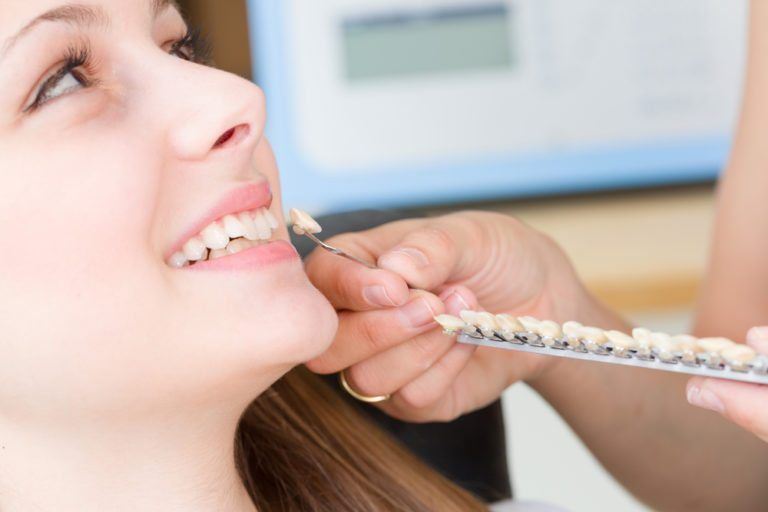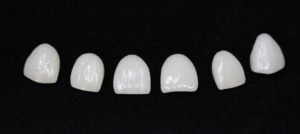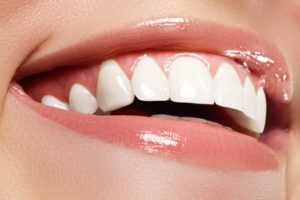Veneers and Laminates

Veneers, also known as porcelain veneers, composite veneers, dental veneers, or simply as laminates, are a popular cosmetic dental option that uses thin shells applied to the front surfaces of visible teeth. Because veneers are adhered to the front surface of teeth, they can quickly and easily correct a variety of dental issues and enhance your smile. For this reason, they are a popular choice among individuals who want a minimally-invasive, almost instant smile makeover.
Did You Know?
By placing dental veneers over your teeth, they can actually help make your teeth stronger and more resistant to tooth sensitivity.
Frequently Asked Questions:
Am I a candidate for veneers?
You may be a candidate for veneers if you are looking for a minimally-invasive way to quickly and easily enhance your smile. Veneers are ideal for correcting the following dental issues:
- Crooked teeth
- Overlapping or overcrowded teeth
- Discolored or permanently stained teeth
- Teeth that are too small
- Oddly shaped teeth
- Cracked, chipped, or otherwise broken teeth
However, it is important to note that veneers are a cosmetic rather than restorative treatment. This means that they are not ideal for unhealthy, decayed, or weakened teeth, or for those with gum disease. If you have any of these dental issues, you will likely need to have them resolved before placing veneers.
To find out if veneers are the right cosmetic dental option for you, schedule a consultation with Dr. Scott. T Simpson of Appletree Dentistry today!
Are there different types of veneers?

The different types of veneers can be based on the dental materials they are made from, as well as their placement procedure. Dental veneers are most commonly made from porcelain, however they can also be made from dental composite. While dental composite is more affordable, porcelain generally lasts longer and has more aesthetic appeal.
Veneers can also be categorized based upon whether or not their placement requires preparation. With this, there are two categories veneers can be divided into: prep or no prep. Traditional veneers require preparation in the form of removing some of the natural tooth structure so they can be properly placed. No-prep veneers, on the other hand, are much thinner and don’t require that any of the tooth’s enamel be removed. To give you an idea, traditional veneers are approximately 0.3-0.5 mm thick and no prep veneers are less than 0.3 mm.
This difference in thickness means that they can be placed differently. However, not everyone is a candidate for no prep veneers. Additionally, it is important to note that because no prep veneers are much thinner, they wear down faster and do not last as long as traditional veneers. Ultimately, if you are considering veneers it is important to discuss your options with Dr. Simpson so he can suggest the best veneer for your individual case.
What can I expect when having veneers placed at Appletree Dentistry?
When having veneers placed at Appletree Dentistry, you can first expect to undergo an initial consultation where your treatment goals and options will be discussed. Dr. Simpson will also evaluate your bite, teeth, and gums to make sure your teeth are healthy enough to handle the placement of veneers. In some cases, you may need to address dental issues such as tooth decay or gum disease prior to placing veneers.
Once you are ready to have your veneers placed, your teeth will be properly anesthetized to keep you comfortable during the procedure. If needed, you can also opt for dental sedation to keep you calm. Then, your teeth will need to be prepared by removing a tiny amount of enamel and reshaping the remaining tooth structure. This is so that the veneers can be applied evenly without looking bulky or irritating the gum line. In cases where no-prep veneers are used, this step is not needed.

You will then have a dental impression taken of your mouth. To obtain a dental impression, you will simply bite down into a metal or plastic tray containing a soft impression material that will gradually harden over the span of about a minute. This will be used to create a model of your mouth that is sent to a dental laboratory so that they can custom fabricate your dental veneers. If you are having traditional veneers placed, you will be offered temporary veneers to wear until your permanent restorations are completed.
Once your veneers are returned to our office in about a week or two, you will return to our office to have your permanent veneers placed. Before placing them, Dr. Simpson will check their fit. Then, they will be adhered to your teeth and the procedure will be complete.
How do I care for my veneers?

You will care for your veneers much like you would your natural teeth. In fact, it is important to note that veneers don’t replace your teeth and you will still need regular dental care to maintain your dental health. To keep your veneers, and your teeth, in good shape, you will need to brush your teeth twice daily using a fluoridated toothpaste and floss once a day. You will also need to schedule regular dental checkups and teeth cleanings with Dr. Simpson at least once every six months. These checkups and cleanings are important to monitor the condition of your veneers and to prevent them from staining.
Additionally, you will also want to prevent your veneers from becoming damaged. Although they are durable, they can be damaged just as your natural teeth can. To prevent damage, we recommend avoiding behaviors such as smoking, biting your nails, chewing on ice, and using your teeth to open packages. Also, if you are a teeth grinder or clincher, we advise wearing a dental mouthguard to protect your veneers and your teeth.
How long do veneers last?
The lifespan of your veneers depends upon the type of veneers and how well you take care of them. Most traditional veneers last for about 10-15 years. As mentioned before, no prep veneers are much thinner and don’t last as long. The average lifespan for no prep veneers is only about 5-7 years.
Are there any downsides to veneers?
As with any type of dental treatment, there are also some downsides. With veneers, the biggest downside is that they require the tooth structure be altered, which means they are not reversible. While you can eventually opt for another restoration method in the future, once you get veneers you can never go back to just your natural teeth.
Also, once they are placed, they can never be repaired or whitened. If your veneer becomes damaged or stained, it will have to be completely removed and replaced. Some people also experience tooth sensitivity after having veneers placed. While this usually fades after the first week for most people, for some it never goes away.
For simply great dental care, schedule a consultation with your Tigard dentist, Dr. Scott T. Simpson of Appletree Dentistry today!


